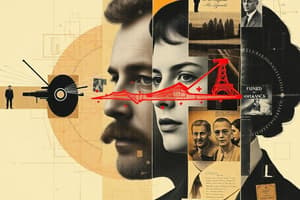Podcast
Questions and Answers
What is the primary function of defense mechanisms as described in the structural theory of the mind?
What is the primary function of defense mechanisms as described in the structural theory of the mind?
- To promote conscious awareness of conflicts
- To express aggressive tendencies
- To maintain self-esteem and equilibrium (correct)
- To enhance the capabilities of the id
Which of the following is not classified as a mature defense mechanism?
Which of the following is not classified as a mature defense mechanism?
- Altruism
- Humor
- Suppression
- Repression (correct)
What characterizes immature defense mechanisms?
What characterizes immature defense mechanisms?
- They are often based on logical reasoning.
- They help in developing healthy coping strategies.
- They frequently exhibit child-like or disturbed behavior. (correct)
- They facilitate emotional and cognitive growth.
How can excessive use of defense mechanisms affect an individual's behavior regarding medical care?
How can excessive use of defense mechanisms affect an individual's behavior regarding medical care?
In the context of transference reactions, what might influence a patient's emotional responses during a medical consultation?
In the context of transference reactions, what might influence a patient's emotional responses during a medical consultation?
What concept underlies psychodynamic theory in explaining behavior?
What concept underlies psychodynamic theory in explaining behavior?
According to Freud's topographic theory, which part of the mind contains repressed thoughts?
According to Freud's topographic theory, which part of the mind contains repressed thoughts?
Which type of thinking is characterized by primitive drives and wish fulfillment, often observed in young children?
Which type of thinking is characterized by primitive drives and wish fulfillment, often observed in young children?
What is the nature of dreams according to psychodynamic theories?
What is the nature of dreams according to psychodynamic theories?
In Freud's structural theory of the mind, which component is responsible for moral standards?
In Freud's structural theory of the mind, which component is responsible for moral standards?
The patient’s belief that all male doctors are incompetent primarily illustrates which psychological concept?
The patient’s belief that all male doctors are incompetent primarily illustrates which psychological concept?
What is the role of primary process thinking in mental health according to psychoanalytic theory?
What is the role of primary process thinking in mental health according to psychoanalytic theory?
Freud's theories suggest that behavior is largely motivated by which type of processes?
Freud's theories suggest that behavior is largely motivated by which type of processes?
At what age does the superego begin to develop?
At what age does the superego begin to develop?
What is a primary characteristic of the id?
What is a primary characteristic of the id?
What process enables one to maintain a sense of reality about the body and the external world?
What process enables one to maintain a sense of reality about the body and the external world?
Which statement best describes the function of the ego?
Which statement best describes the function of the ego?
What type of thinking does the conscious mind primarily utilize?
What type of thinking does the conscious mind primarily utilize?
Which component of Freud's Structural Theory is NOT influenced by external reality?
Which component of Freud's Structural Theory is NOT influenced by external reality?
What mental level contains thoughts that can be easily accessed but are not currently in awareness?
What mental level contains thoughts that can be easily accessed but are not currently in awareness?
Which of the following best describes the characteristics of the superego?
Which of the following best describes the characteristics of the superego?
Which defense mechanism involves behaving in a socially inappropriate manner to avoid personal emotions?
Which defense mechanism involves behaving in a socially inappropriate manner to avoid personal emotions?
What is the primary purpose of rationalization as a defense mechanism?
What is the primary purpose of rationalization as a defense mechanism?
A person who avoids feeling grief after a loss by logically discussing the details of it is exhibiting which defense mechanism?
A person who avoids feeling grief after a loss by logically discussing the details of it is exhibiting which defense mechanism?
Which defense mechanism allows someone to project their own unacceptable feelings onto others?
Which defense mechanism allows someone to project their own unacceptable feelings onto others?
What defensive approach is demonstrated when an individual insists they are 'just a social drinker' despite alcohol issues?
What defensive approach is demonstrated when an individual insists they are 'just a social drinker' despite alcohol issues?
Which defense mechanism involves reverting to behavior appropriate for a younger age?
Which defense mechanism involves reverting to behavior appropriate for a younger age?
An individual who feels an intense rage but channels it into becoming a professional fighter is using which mechanism?
An individual who feels an intense rage but channels it into becoming a professional fighter is using which mechanism?
What is an example of idealization in a therapeutic context?
What is an example of idealization in a therapeutic context?
What does dissociation often involve in terms of memory?
What does dissociation often involve in terms of memory?
Which defense mechanism is exemplified by a child who has been bullied becoming a bully themselves?
Which defense mechanism is exemplified by a child who has been bullied becoming a bully themselves?
What mechanism is illustrated by a woman who expresses emotional discomfort through laughter?
What mechanism is illustrated by a woman who expresses emotional discomfort through laughter?
Which of the following mechanisms involves categorizing experiences as entirely positive or entirely negative?
Which of the following mechanisms involves categorizing experiences as entirely positive or entirely negative?
An individual who helps others to distract themselves from their own negative feelings is using which mechanism?
An individual who helps others to distract themselves from their own negative feelings is using which mechanism?
Which mechanism involves consciously pushing unwanted emotions out of awareness?
Which mechanism involves consciously pushing unwanted emotions out of awareness?
Flashcards
Structural Theory of Mind
Structural Theory of Mind
The mind has three parts: the id, ego, and superego.
Defense Mechanisms
Defense Mechanisms
Unconscious mental techniques used by the ego to reduce anxiety & maintain safety.
Defense Mechanisms (Maturity)
Defense Mechanisms (Maturity)
Mental strategies that can help patients/others when used moderately (e.g., altruism, humor, sublimation, suppression).
Repression
Repression
Signup and view all the flashcards
Transference
Transference
Signup and view all the flashcards
Id
Id
Signup and view all the flashcards
Ego
Ego
Signup and view all the flashcards
Superego
Superego
Signup and view all the flashcards
Unconscious
Unconscious
Signup and view all the flashcards
Preconscious
Preconscious
Signup and view all the flashcards
Conscious
Conscious
Signup and view all the flashcards
Primary Process Thinking
Primary Process Thinking
Signup and view all the flashcards
Secondary Process Thinking
Secondary Process Thinking
Signup and view all the flashcards
Unconscious mind
Unconscious mind
Signup and view all the flashcards
Primary process thinking
Primary process thinking
Signup and view all the flashcards
Dreams
Dreams
Signup and view all the flashcards
Topographic theory
Topographic theory
Signup and view all the flashcards
Preconscious mind
Preconscious mind
Signup and view all the flashcards
Defense mechanisms
Defense mechanisms
Signup and view all the flashcards
Splitting
Splitting
Signup and view all the flashcards
Psychoanalytic theory
Psychoanalytic theory
Signup and view all the flashcards
Acting Out
Acting Out
Signup and view all the flashcards
Altruism
Altruism
Signup and view all the flashcards
Denial
Denial
Signup and view all the flashcards
Displacement
Displacement
Signup and view all the flashcards
Dissociation
Dissociation
Signup and view all the flashcards
Humor
Humor
Signup and view all the flashcards
Idealization
Idealization
Signup and view all the flashcards
Identification (Introjection)
Identification (Introjection)
Signup and view all the flashcards
Intellectualization
Intellectualization
Signup and view all the flashcards
Isolation of Affect
Isolation of Affect
Signup and view all the flashcards
Projection
Projection
Signup and view all the flashcards
Rationalization
Rationalization
Signup and view all the flashcards
Reaction Formation
Reaction Formation
Signup and view all the flashcards
Regression
Regression
Signup and view all the flashcards
Splitting
Splitting
Signup and view all the flashcards
Study Notes
Psychoanalytic Theory and Defense Mechanisms
-
Psychoanalytic theory posits that behavior stems from unconscious mental processes.
-
Freud's theories include the topographic and structural theories of the mind.
-
Topographic theory subdivides the mind into:
- Unconscious: Repressed thoughts and feelings, primary process thinking (no logic, seeks pleasure).
- Preconscious: Memories accessible, but not immediately present.
- Conscious: Current thoughts and feelings, secondary process thinking (logic based).
-
Structural theory divides the mind into:
- Id: Instinctive drives, present at birth, operates on pleasure principle.
- Ego: Mediates between the id and external reality, uses defense mechanisms.
- Superego: Moral values and conscience, develops around age 6.
-
Defense mechanisms are unconscious mental techniques used by the ego to reduce anxiety. Examples include:
- Acting out: Socially inappropriate behaviors to handle unacceptable emotions.
- Altruism: Helping others to offset personal conflicts.
- Denial: Refusal to acknowledge reality.
- Displacement: Redirecting emotions from a source to a less threatening target.
- Dissociation: Separating parts of one's consciousness from real events.
- Humor: Expressing unpleasant feelings without emotional harm.
- Identification: Imitating a person(s) to cope with their power.
- Intellectualization: Relying on logic rather than emotions to cope.
- Isolation of affect: Separating emotion from ideas.
- Projection: Attributing unacceptable emotions to others.
- Rationalization: Developing logical reasons to justify negative behavior or emotions.
- Reaction formation: Adopting opposite attitudes to avoid unacceptable emotions.
- Regression: Reverting to behaviors at an earlier stage of development.
- Splitting: Categorizing people as all good or all bad.
- Sublimation: Channeling socially unacceptable feelings into acceptable activities.
- Suppression: Consciously diverting attention from distressing feelings.
- Undoing: Attempting to reverse an undesirable event by performing opposite behavior.
-
Transference is an unconscious mental attitude based on important past relationships, which can affect doctor-patient interactions.
- Positive transference: Patient shows confidence in doctor, intense feelings of adoration or infatuation.
- Negative transference: Resentment or anger toward the doctor due to unmet needs.
-
Countertransference: Doctor's unconscious reactions to the patient, potentially influencing clinical judgment.
Studying That Suits You
Use AI to generate personalized quizzes and flashcards to suit your learning preferences.
Related Documents
Description
Explore the foundations of psychoanalytic theory and the various defense mechanisms proposed by Freud. This quiz covers topics such as the topographic and structural theories of the mind, including the concepts of unconscious, preconscious, id, ego, and superego. Test your understanding of how these elements influence behavior and mental processes.




